Iraqi PM Tells Raisi Baghdad Will Not Allow Threats From Its Territory
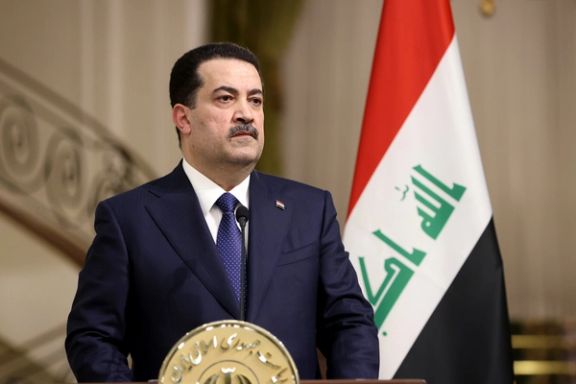
While Iran’s IRGC has launched missile attacks on Iraq’s Kurdistan region, Iraqi Prime Minister says his government will not allow its territory to be used to “harm any side.”

While Iran’s IRGC has launched missile attacks on Iraq’s Kurdistan region, Iraqi Prime Minister says his government will not allow its territory to be used to “harm any side.”
Mohammed Shia' Al Sudani made the comments Tuesday in a meeting with Iranian President Ebrahim Raisi as part of his visit to the Iranian capital.
The Iraqi official said, “It is the policy of the Iraqi government that this country should not be the starting point for actions harming the countries of the region.”
In the meeting, Ebrahim Raisi claimed the Islamic Republic supports a united and strong government in Iraq.
Raisi said relations between Tehran and Baghdad must be expanded to establish more peace and stability in the region and the world.
Since the eruption of nationwide protests in Iran, regime officials have accused Kurdish opposition groups in northern Iraq of fueling the unrest, with the IRGC repeatedly launching deadly attacks on the neighboring country’s northern territories.
The latest round of shelling of Iraqi Kurdistan region drew condemnation by Western countries as well as the Iraqi government.
Iraqi Foreign Minister Fuad Hussein decried the attacks as a violation of Iraq's sovereignty and Kurdistan Region Prime Minister Masrour Barzani also condemned the “violations” of Iraq and its Kurdish region’s sovereignty.
The US also strongly condemned Iran’s “violations of Iraqi sovereignty”, calling on the Islamic Republic to stop attacking its neighbor.

The Israeli Air Force will hold large joint drills with the United States to simulate strikes against Iran’s nuclear program.
Releasing a statement on Tuesday, the Israel Defense Forces announced that the joint aerial wargames with the US military is to practice strikes against the Islamic Republic and its proxies in the region.
The two-day drills will be launched on Tuesday over parts of Israel and theMediterranean Sea, and include long-range flights needed by Israeli pilots to undertake to reach Iran.
The maneuvers come after IDF chief Aviv Kohavi visited the USlast week urging the defense officials that the two countries must speed up joint plans for offensive actions against Iran.
“In order to improve our capabilities in the face of challenges in the region, joint activity with the US Central Command will be significantly expanded in the near future,” Kohavi said after returning to Israel.
The Islamic Republic began enriching uranium to 60% purity at its Fordow nuclear plant last week, saying the move was in response to the resolution criticizing its lack of cooperation with the IAEA.
That purity is below the 90% needed for weapons-grade material but well above the 20% Iran produced before its 2015 agreement with major powers that capped enrichment at 3.67%.

Many countries and international organizations have voiced support for protests in Iran by adopting resolutions and issuing condemnations of government violence, but people wonder about tangible actions.
Many countries and international organizations have voiced support for protests in Iran by adopting resolutions and issuing condemnations of government violence, but people wonder about tangible actions.
The United States Monday circulated a draft resolution on a measure to expel the Islamic Republic from the UN Commission on the Status of Women. The measure to remove Iran from the women's equality and empowerment body is scheduled to be voted on December 14.
The Islamic Republic has just started a four-year term on the 45-member commission, which meets annually every March.
The document also denounces Iran's policies as "flagrantly contrary to the human rights of women and girls and to the mandate of the Commission on the Status of Women." Canada, New Zealand, Netherlands and the United States are behind the push.
The resolution would "remove with immediate effect the Islamic Republic of Iran from the Commission on the Status of Women for the remainder of its 2022-2026 term."
"The US and others have been actively working the phones to garner support to remove Iran from the UN Commission on the Status of Women," said a UN diplomat, speaking on condition of anonymity to Reuters. "It seems like they're making traction – including with some initially hesitant countries."
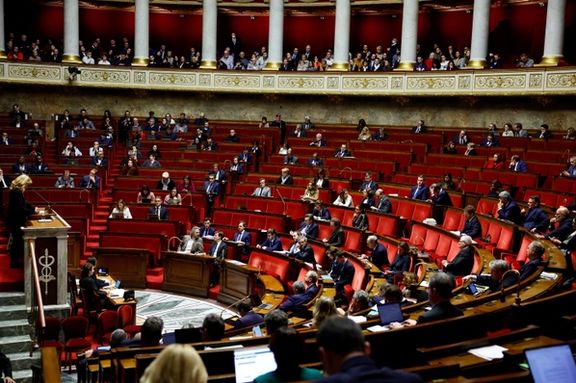
Also on Monday, the French National Assembly unanimously adopted a resolution offering "support for the Iranian people" and condemning the restriction of women's freedoms and rights. This comes ahead of another meeting of EU foreign ministers to discuss new sanctions over the crackdown on protesters.
President Emmanuel Macron's Renaissance party deputy Hadrien Ghomi, himself a descendant of Iranian immigrants, said the 149 votes in favor of the motion in the National Assembly "sent a strong message" to the world. The resolution condemns in the "strongest terms the brutal and widespread repression" against "non-violent demonstrators".
French Foreign Minister Catherine Colonna said that the situation "requires action, with responsibility", adding that after two packages of sanctions already imposed at a European level, new sanctions are being prepared for the next Council of Foreign Ministers on 12 December.
But many Iranians ask if statements and resolutions are enough to pressure the theocratic regime in Tehran. More forceful steps, such as closing all European embassies in Iran or imposing more sanction to directly pressure the ruling elite are possible additional measures people mention in their social media posts.
These all came after the Geneva-based UN Rights Council last week voted to appoint an independent investigation into the Islamic Republic's deadly repression of protests, passing the motion to cheers of activists. Accused Western states of using the council to target Iran in an "appalling and disgraceful" move, Tehran said Monday that it will reject the investigation into the country's repression of antigovernment protests, like it refused to cooperate with UN human rights rapporteurs for 30 years.
Some Iranian officials have started to acknowledge some of its atrocities with Revolutionary Guards general Amirali Hajizadeh saying Tuesday that more than 300 people have been killed in the protests, acknowledging that innocent people have also been killed.
"Everyone in the country has been affected by the death of this lady [Amini]. I don't have the latest figures, but I think we have had perhaps more than 300 martyrs and people killed in this country, including children, since this incident," said Hajizadeh, head of the Guards' aerospace division.
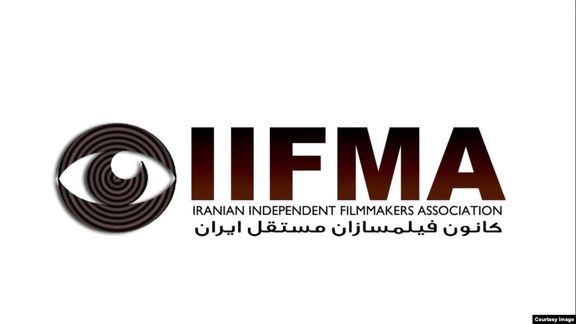
A group of Iranian filmmakers have formed a new entity called “Iranian Independent Filmmakers Association” in support of the antigovernment protest movement.
In their statement on Monday four issues have been raised as the goals of the association.
Preventing repression and violence against peaceful protesters and innocent children, unconditional release of prisoners, drawing the attention of the world's filmmakers to events in Iran and “exposing the tactics of propaganda machine of the Islamic regime” are announced as the main goals of the group.
“Iranian protesters chant ‘Women, Freedom, Life’ and are being beaten, shot, arrested, tortured, and executed in every corner of their country by regime’s security forces. During this fateful and historical time, we, a group of independent filmmakers, who believe in the universal language of cinema as a powerful narrator of truth and peace, have come together to seek [our objective],” reads the statement.
The government tried to influence and control official associations representing filmmakers, artists or professionals.
Adeleh Cheraghi, one of the spokespersons of this association, told BBC Farsi that so far more than fifty Iranian filmmakers have become members of the group, including Shirin Neshat, Mostafa Azizi, Abdul Reza Kahani, Nima Sarvestani, Kaveh Farnam and Ali Abbasi.
According to her, the names of some members of the association will be published later “due to the existing security conditions and repression” inside and outside Iran.
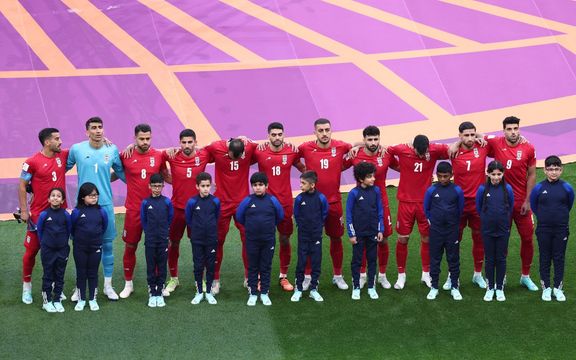
Why Iran’s football (soccer) team in Qatar refused to sing the national anthem in its first game, which was their subtle gesture amid popular protests.
Every country has national symbols that represent its rich culture and history, traditions, and unique attributes of the land and its people. The national anthem is one such symbol that evokes feelings of patriotism among the citizens, binds them with a united purpose and collective identity, and reminds them of what they perceive as their nation's glorious heritage. It is nearly universal that national anthems demand reverence and are viewed by many as a sacred representation of their nation. It is common to see people rise and place a hand on their heart to show their commitment to their land and display their patriotism as they hear their anthem performed.
As Iran’s widespread protests enter their third month, there is an unusual phenomenon that is visible on the world stage. Many Iranians are distancing themselves from their national anthem. Iranian athletes competing in national and international arenas have chosen silence and adopted a posture of mourning during the opening ceremonies with the anthem playing. In none of the clips of popular unrests emerging from Iran has the anthem been featured or chanted. It may seem out of place that a movement of freedom for Iran would eschew what is supposed to be a symbol of national unity. But a review of the history of this anthem adopted in 1990 by the Islamic Republic provides clues as to why Iranians have moved away from this “national symbol.”
The current national anthem of Iran is the third anthem adopted by the Islamic Republic since the 1979 revolution. For three months after the revolution, “Ey Iran” was the anthem which was non-political and non-religious and recounted the history, beauty, resilience, and culture of Iran. Subsequently, to promote the identity of the Islamic Republic, another anthem entitled “Payandeh Bada Iran” was adopted that celebrated the achievements of the Revolution. After the end of the Iran-Iraq war in 1988 and the death of Supreme Leader Ayatollah Ruhollah Khomeini in 1989, a competition was announced for a new national anthem to raise the spirits of the war torn and mournful nation. This led to the adoption in 1990 of “Sorude Melliye Jomhuriye Eslamiye Iran” which translates as the National Anthem of the Islamic Republic of Iran.
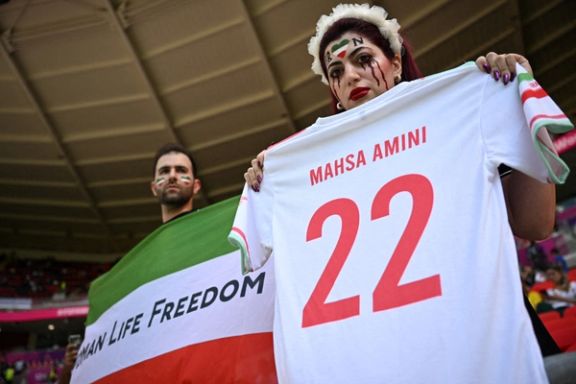
The current anthem is short. The translation of the lyrics are as follows:
“Above the horizon rises the Eastern Sun,
The light in the eyes of the believers in truth,
The month of Bahman the pride of our faith,
Your message, O Imam [Khomeini], of independence and freedom is imprinted on our souls.
O martyrs! Your clamors echo in the ears of time:
May you endure eternally,
The Islamic Republic of Iran!”
In reviewing the lyrics, the only symbolism that celebrates the heritage of the nation is the Eastern Sun. The reference to the Sun has literary and cultural implications to the land, its calendar, and its history. But the rest of the lyrics depart from Iran’s national identity and focuses on the events and figures relating to the 1979 Revolution and its aftermath.
Since nature of the revolution was Islamic, the Sun in the first line ends up only illuminating the “eyes of believers in truth” thereby disregarding those who may believe differently than the ruling power apparatus. The month of Bahman overlaps with February, and this is a reference to the February 1st, 1979, return of the Ayatollah to Iran and the February 11th declaration of the victory of the Islamic Revolution. Why would a calendar month be represented as the pride of one’s faith? This cannot be simply faith in Islam or in the nation. This is faith in the Islamic Republic whose inception was in that fateful February (Bahman) of 1979. This further narrows the people for whom the anthem is meaningful.
In the lyrics, we come across a specific reference to Ayatollah Khomeini and a focus on his message of Independence and Freedom. Nearly 44 years have elapsed since those promises were made, and Iranians today feel that the message of the Ayatollah was only a mirage as Iran today is neither independent nor free by any stretch of the imagination.
The final part of the lyrics places words in the mouths of the fallen soldiers of the Iran-Iraq war of 1980-88. The fallen soldiers, referenced as martyrs, fought for Iran and its territorial integrity. But in a distortion of history, the lyrics suggest that their voices echo in the ears of time to eternally preserve the “Islamic Republic” rather than the nation of Iran. The sons and daughters of fallen soldiers have taken to social media to refute this notion. Additionally, the current system of government in Iran does not bear any of the hallmarks of a republic.
The sustained voices of the people of Iran are loud and clear. They want regime change. They do not wish to have a dictator as a Supreme Leader. They no longer wish to live under the Islamic Republic with its unsustainable policies within Iran and its ill-conceived engagement with the world. So, it is no surprise that an anthem that limits Iran’s definition to the confines of a particular ideology called the “Islamic Republic”, disregards its symbolism and heritage, overlooks its ancient history, and celebrates a figure with hollow promises, is mere propaganda to the Iranians rather than a symbol of national unity.
Nizam Missaghi is an Iranian-American physician. Due to being denied access to higher education under the Islamic Republic, he left Iran at 18 to pursue his education. He currently practices in the US and is also a clinical assistant professor of anesthesiology at the University of Arizona School of Medicine. He serves on the board of Iran Human Rights Documentation Center and has delivered lectures and written articles on Iran related topics.
The opinions expressed by the author are not necessarily the views of Iran International

Iran and the US are set for their clash on the soccer pitch with both at the risk of elimination from the 2022 Qatar World Cup, one of the most contentious in history.
The final of Group B – the most politically charged group at this year's tournament – is set to be held on Tuesday night. Iran won its previous match against 10-man Wales 2-0 after its humiliating 6-2 loss against England. The Americans, however, displayed a stable performance in their two earlier matches that ended with a goalless draw against England and a 1-1 tie with Wales.
The Iranian squad – nicknamed Team Melli – needs at least a draw to book a berth for the knockout stage but the Yanks must defeat Iran if they want to keep their hopes alive in the competitions. However, Team Melli players are between a rock and a hard place as many Iranians believe the so-called national team does not represent the nation and is only a propaganda tool for the ruling Islamic regime.
One of the controversial issues is whether or not Team Melli would sing along with the Islamic Republic anthem. The players remained silent during their opener against England but after the match, people’s reactions on social media and streets indicated that the gesture was not enough to forgive the players, who have lost popularity due to their lack of support for the current wave of popular protests. In their second match, the players sang along with the anthem and even celebrated boisterously after scoring goals and winning the match, setting the ground for the world to witness the rift in Iranian society.
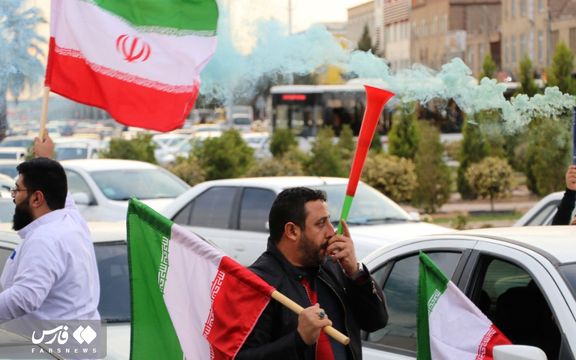
Most Iranians were filled with mixed emotions following the match against Wales. Until recently, whenever Team Melli managed to defeat another country, people would pour into streets and celebrate as security forces were watching and waiting for them to start chanting antigovernment slogans, so they would intervene and disperse the crowd. This time was different. Security forces – some of whom were killing the antigovernment protesters since September – seemed to have been ordered to celebrate and dance on streets, creating some of the most surreal scenes in large cities. The regime had managed to make the players so distant from the people that an event – which historically tends to morph into an antigovernment rally – turned into a show of public satisfaction for the regime.
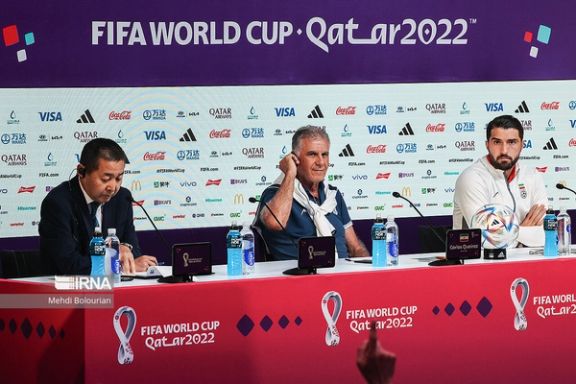
It did not take long until documents and audio footage were leaked online that proved people’s conjectures were actually right. The hacktivist group Black Reward got access to Fars news agency, affiliated with the country’s Revolutionary Guards, and released documents that showed the Islamic Republic had taken numerous measures to make the best use of the World Cup opportunity in Qatar. They had done everything they could think of for a good show in support of the Islamic Republic: from giving free tickets to over 6,000 of their apparatchiks to attend the matches; collaborating with Qatari officials to get the list of people who had bought tickets, and ensuring that Team Melli’s coach Carlos Queiroz would cooperate with them in their plans. They even pulled some strings to make sure that Iran International reporters were not allowed in Qatar.
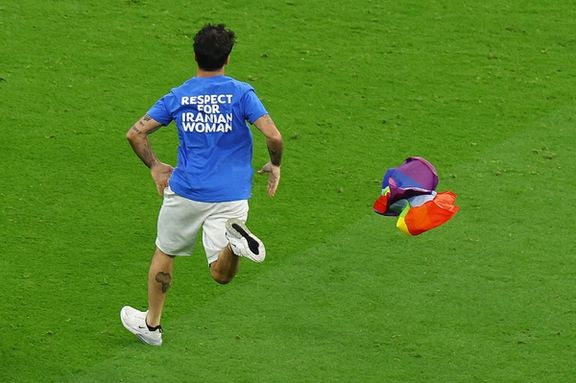
Citing a source involved in the security of the games, CNN reported Monday that even the families of Team Melli players have been threatened with imprisonment and torture if the players fail to “behave” ahead of the match against the USA. The source added that the players were called to a meeting with members of the Revolutionary Guard (IRGC), saying that they were told their families would face “violence and torture” if they did not sing the anthem or if they show any act of protest against the Tehran regime.
Sunday night, Iran’s President Ebrahim Raisi also held a phone conversation with Qatari Emir Tamim bin Hamad Al Thani and football was not mentioned in official reports about the call, but for many Iranians something must have been discussed.